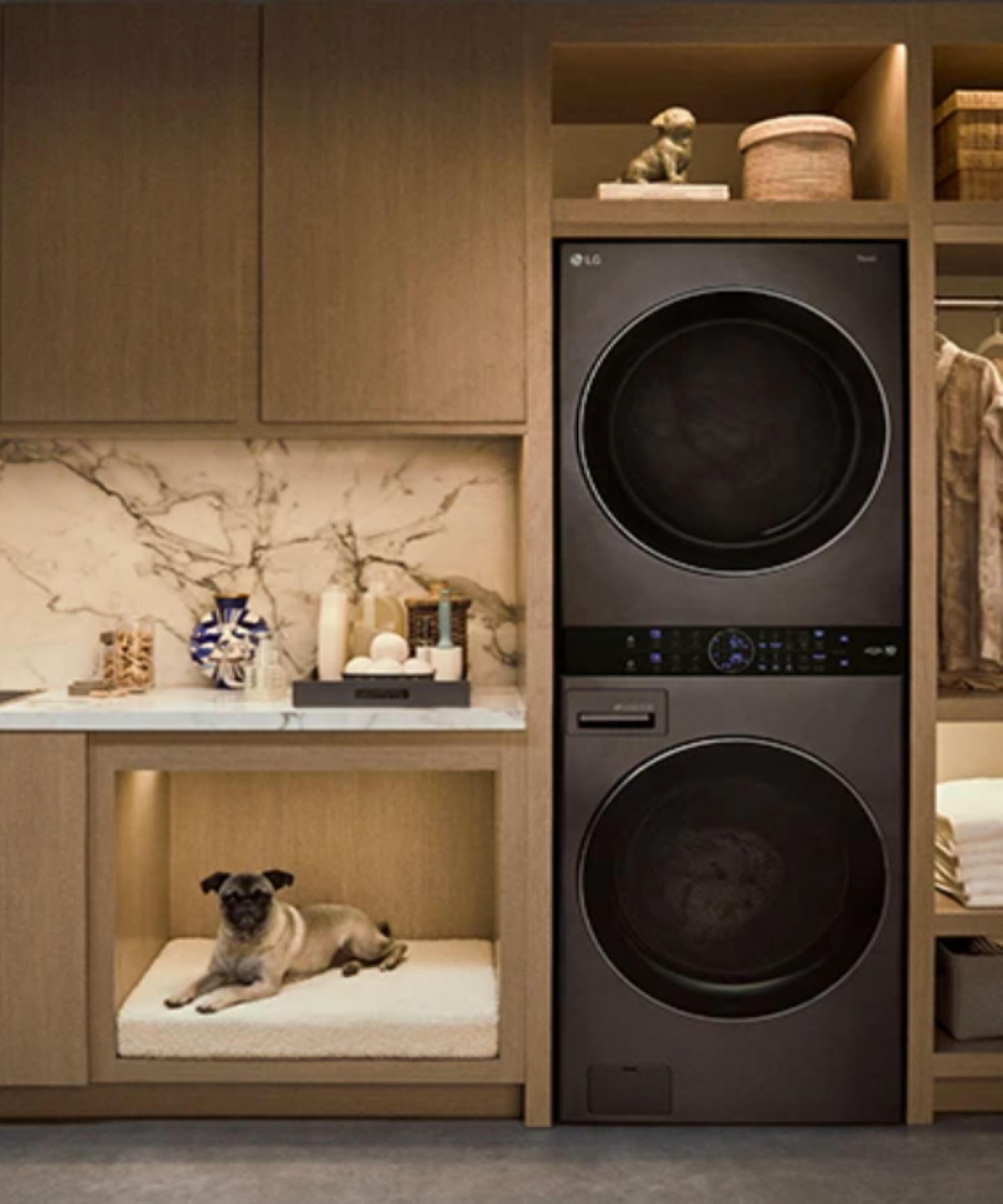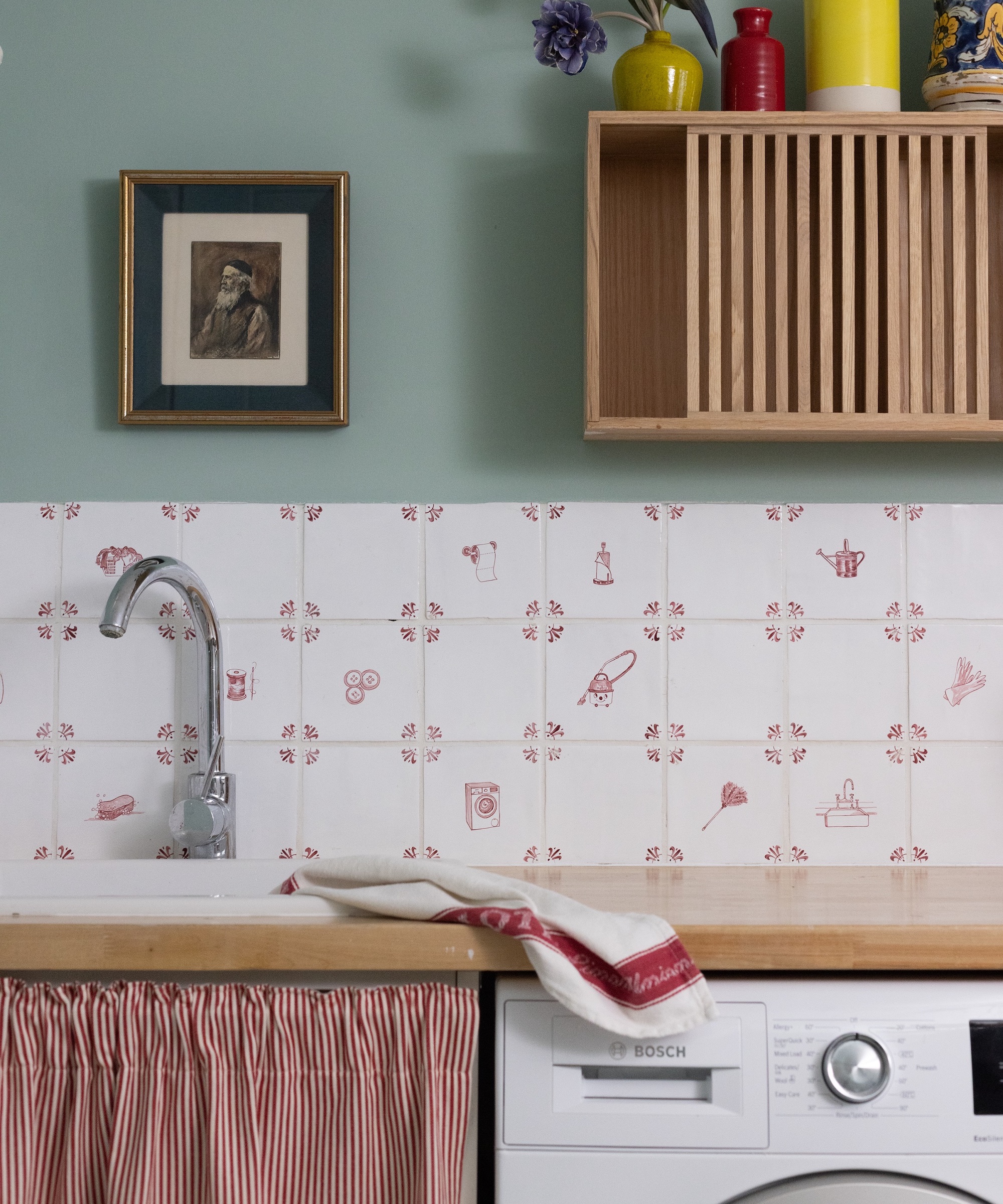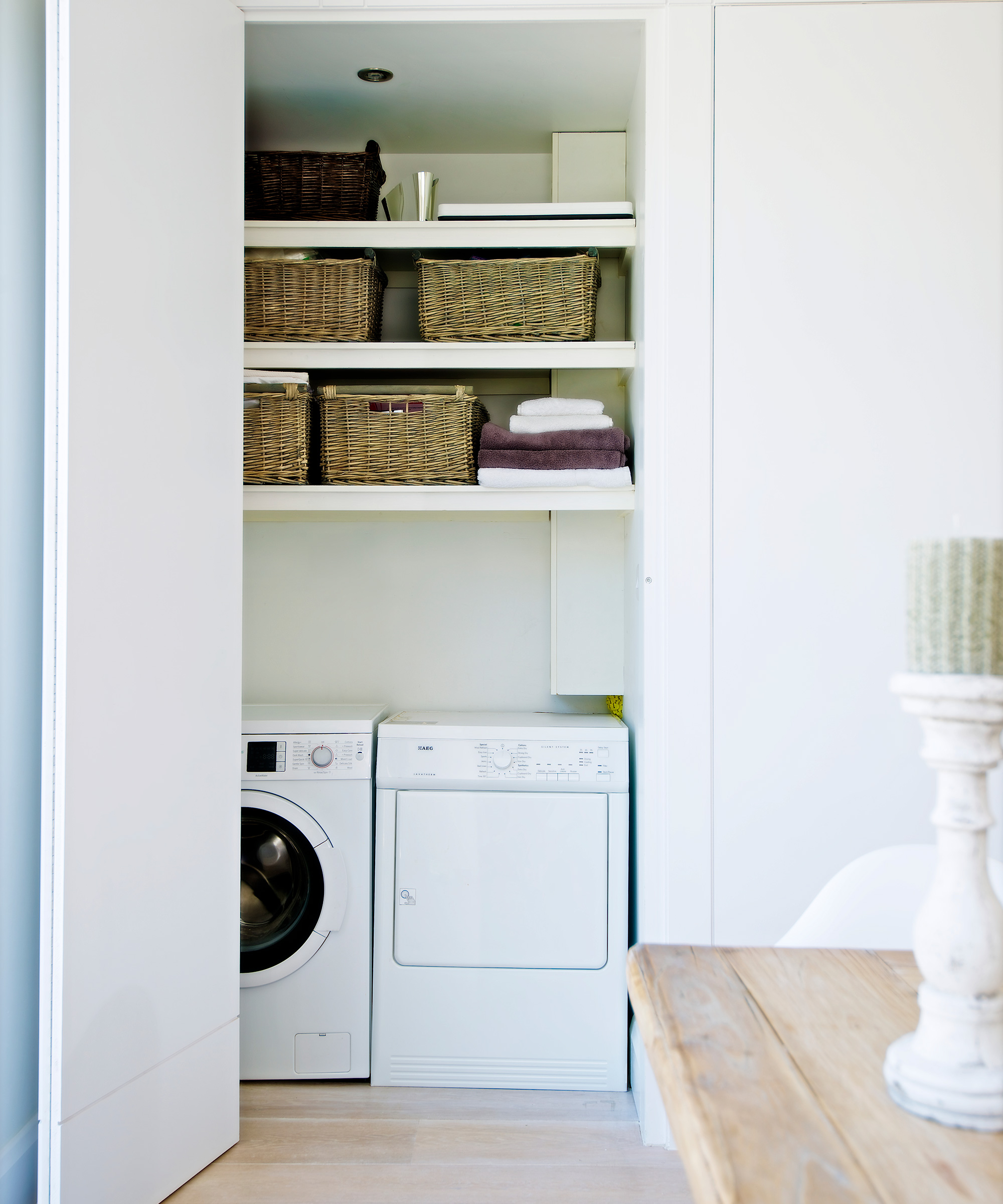Why is my washer leaking from underneath? Appliance repair expert reveals the most common causes, plus the quick fixes you can apply yourself
Identifying the problem is simpler than you might think

Day in day out, our washing machines do a lot for us, so it's no surprise that they occasionally break. Still, that doesn't change how frustrating it is to be dealing with a fault, such as a washer leaking from underneath.
Of course, it's alarming to see water leaking from your washing machine, but even the best washing machines have issues from time to time. Fortunately, the problem isn't as difficult as you might think to troubleshoot yourself.
I spoke with a seasoned appliance repair expert about how to pin point the cause of the the washer's leak. And if you're confident you can do so safely, you can even fix it yourself.
Why is my washing machine leaking from underneath?

I spoke with Ian Smith, appliance repair expert from Domestic & General who has over 35 years of experience fixing washing machines with this exact problem.
'One of the most common causes are a leak from the water feed that goes into the machine,' Ian explains. The water feed is the connection between your home's plumbing and the washer's water inlet valve, usually consisting of two hoses: one for cold water and one for hot. You can find these at the back of the appliance.
If you find that your washer keeps leaking during a spin cycle, it's most likely an issue with the hoses.
'Loose or damaged water pumps or internal drain hoses can also cause your washing machine to leak from underneath,' Ian adds. This 'damage' can be as simple as the hose being clogged, or as frustrating as a hole in the water pump.
Ian emphasizes that, 'It’s important to remember however that just because you notice water collecting from the bottom of the machine, it does not necessarily mean that the leak is at the bottom.'
Instead, the washer leak could be coming from any number of common issues. A worn door seal or an unbalanced machine are likely culprits, just as they could also explain why your washing machine is shaking.
Luckily, issues like these force you to do some essential maintenance, and will help with how long your washing machine lasts.
Finding the leak in your washer

Before carrying out any checks to identify the source of the leak, make sure the appliance is switched off and unplugged to avoid any nasty electrical shocks.
'To check the hoses, you can wrap paper towels around them and run a short cycle; if the paper is wet, this could mean there is a leak,' Ian explains. 'Inspect the hoses for any rips or tears, and finally check the seals. If you find a rip, the hose will need to be replaced.'
You can find replacement washing machine hoses at Home Depot for hundreds of new and old washing machine models. They're relatively inexpensive, and replacing a washing machine hose is a task you can easily do yourself.
'The pump filter is usually found at the bottom of your washing machine, so you can try removing the panel and unscrewing the filter for inspection,' says Ian. Put down a towel to catch any of the excess water that might come out, then look for any visible damage or debris.
'Make sure to clean the filter and check the seal, as any small bits of debris caught here can cause it to leak,' Ian suggests, and while you're at it, it wouldn't hurt to clean the washing machine itself. It helps keep the appliance in top working order.
Once you've found where the leak's coming from, you'll be able to assess if it's a problem you can fix yourself or if it's time to call in the pros.

If the water is pooling in front of the machine, chances are the leak is coming from the door, and you can check by inspecting the gasket (the door's seal) for any rips or wear and tear. If the door isn't tightly sealed all around the gasket, water can easily leak out.
'The gasket can get damaged over time from sharp clothing items like zips, or small objects left in clothes during the washing process,' Ian explains, highlighting the importance of avoiding classic washing machine mistakes.
A gasket is something you can replace yourself, but it's very much dependent on the type of model. Check the washing machine's manual to find out the type of gasket you need, then browse Home Depot or Amazon to see if they have the right one.
FAQs
Should I call a professional if my washer is leaking from underneath?
While many of the above issues can be fixed yourself, it's up to you whether they should be. To know for certain the appliance has been fixed safely and reliably, call an expert. They'll have all the proper tools and equipment as well as understanding the right parts for the machine. It's also worth checking if your under is under warrantee or not.
However, if you're confident doing repairs, you could save yourself a great deal of money by getting into it yourself. You'll probably be able to do the same if your dryer is leaking water, too.
Is it dangerous for my washing machine to leak?
'Washing machines are electrical items, so this means there are significant risks of electric shocks if water gets near any electrical components,' Ian notes. 'This is why it is important to be safe with your checks, and call a repair expert if you are unsure.'
Water leaking from the machine can also be a slip hazard, as well as leading to the growth of mold and mildew that you likely won't notice straight away as it's buried under the appliance.
Can overloading the washing machine cause it to leak?
Overloading the washing machine puts extra stress on the machine's components, so it can certainly cause it to leak, as well as potentially making your washer stop draining or spinning.
Try running an empty cycle to see if the washing machine still leaks. If it doesn't, you've found the issue.
To continue getting the most from your washer, avoid these mistakes you're making with powder detergent and the mistakes that ruin clothes when washing colors.
Sign up to the Homes & Gardens newsletter
Design expertise in your inbox – from inspiring decorating ideas and beautiful celebrity homes to practical gardening advice and shopping round-ups.

Dan is the Home Tech Editor for Homes & Gardens, covering all things cleaning, smart home, sound and air treatment across the Solved section. Having worked for Future PLC since July 2023, Dan was previously the Features Editor for Top Ten Reviews and looked after the wide variety of home and outdoor content across the site, but their writing about homes, gardens, tech and products started back in 2021 on brands like BBC Science Focus, YourHomeStyle and Gardens Illustrated.
They have spent more than 200 hours testing and reviewing vacuums for Homes & Gardens, and have even visited Dyson's engineering labs for the full low-down of the ins and outs of our trusty cleaners.
Dan has a BA in Philosophy and an MA in Magazine Journalism. Outside of work, you'll find them at gigs and art galleries, cycling somewhere scenic, or cooking up something good in the kitchen.
You must confirm your public display name before commenting
Please logout and then login again, you will then be prompted to enter your display name.
-
 Is the viral salt hack the secret to a weed-free patio? A garden expert warns of irreparable, long-term damage – plus reveals the safest way to get results
Is the viral salt hack the secret to a weed-free patio? A garden expert warns of irreparable, long-term damage – plus reveals the safest way to get resultsYou might have seen gardeners on TikTok or Instagram using salt to kill weeds in pavers, but this hack should be avoided at all costs
By Thomas Rutter Published
-
 9 longest-living houseplants – expert recommendations and tips for species that can live over 10 years
9 longest-living houseplants – expert recommendations and tips for species that can live over 10 yearsInvest in these houseplants now for years of luscious foliage in your home
By Tenielle Jordison Published
-
 I’m an HVAC technician, and this is when I turn my AC on each year – plus 5 checks I always do beforehand
I’m an HVAC technician, and this is when I turn my AC on each year – plus 5 checks I always do beforehandSave yourself an AC hassle by running my checks and turning it on before big heat hits
By Josh Mitchell Published
-
 6 things you should never throw in the trash – and what to do for safe disposal instead
6 things you should never throw in the trash – and what to do for safe disposal insteadFrom batteries to space heaters, experts reveal what not to throw
By Andy van Terheyden Published
-
 7 spring home maintenance mistakes to never make – overlooking these now can lead to pest problems and structural damage
7 spring home maintenance mistakes to never make – overlooking these now can lead to pest problems and structural damageHome improvement pros share common mistakes and what to do instead
By Eve Smallman Published
-
 10 common but little-known HOA fines to watch out for – and how to avoid them
10 common but little-known HOA fines to watch out for – and how to avoid themFrom sprinklers to garage doors and external pipes, your HOA contract may leave you open to a fine
By Eve Smallman Published
-
 I’m a homes editor and these are the 4 vital storage items I’m 'adding to cart' this spring – and why you should too
I’m a homes editor and these are the 4 vital storage items I’m 'adding to cart' this spring – and why you should tooI've learned a few hard lessons in recent weeks and these storage solutions will help
By Punteha van Terheyden Published
-
 7 things you should repair instead of replace in your home – and how to complete the job well yourself in a few simple steps
7 things you should repair instead of replace in your home – and how to complete the job well yourself in a few simple stepsEasy steps for fixing common household items
By Eve Smallman Published
-
 Why does my carpet feel damp? Property experts reveal the 3 causes and how to fix them properly to avoid mold
Why does my carpet feel damp? Property experts reveal the 3 causes and how to fix them properly to avoid moldCondensation doesn't just gather on your windows
By Dan Fauzi Published
-
 The 5 things you should never recycle at home – 'most people don’t realize' how damaging it can be, experts warn
The 5 things you should never recycle at home – 'most people don’t realize' how damaging it can be, experts warnOne wrong move can make the whole batch redundant, experts warn
By Ciéra Cree Published